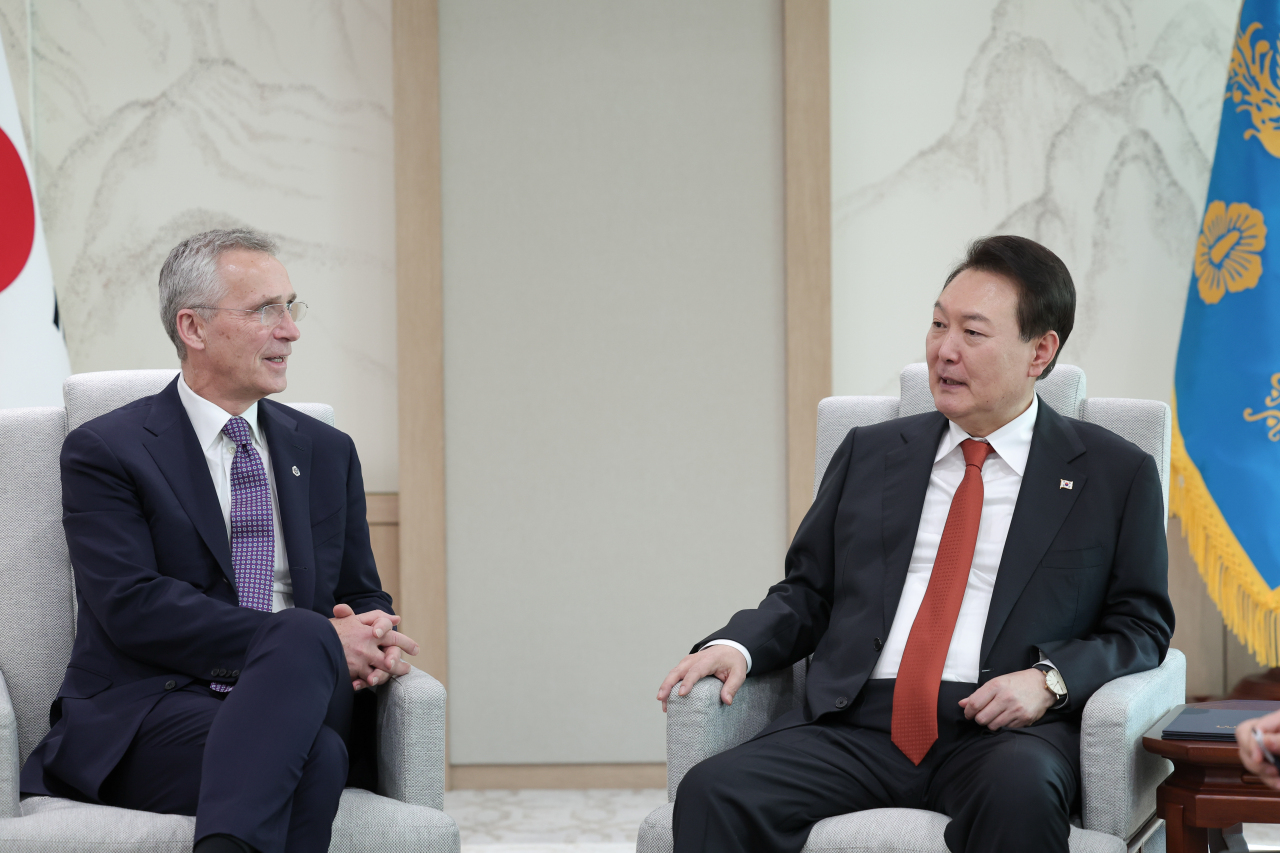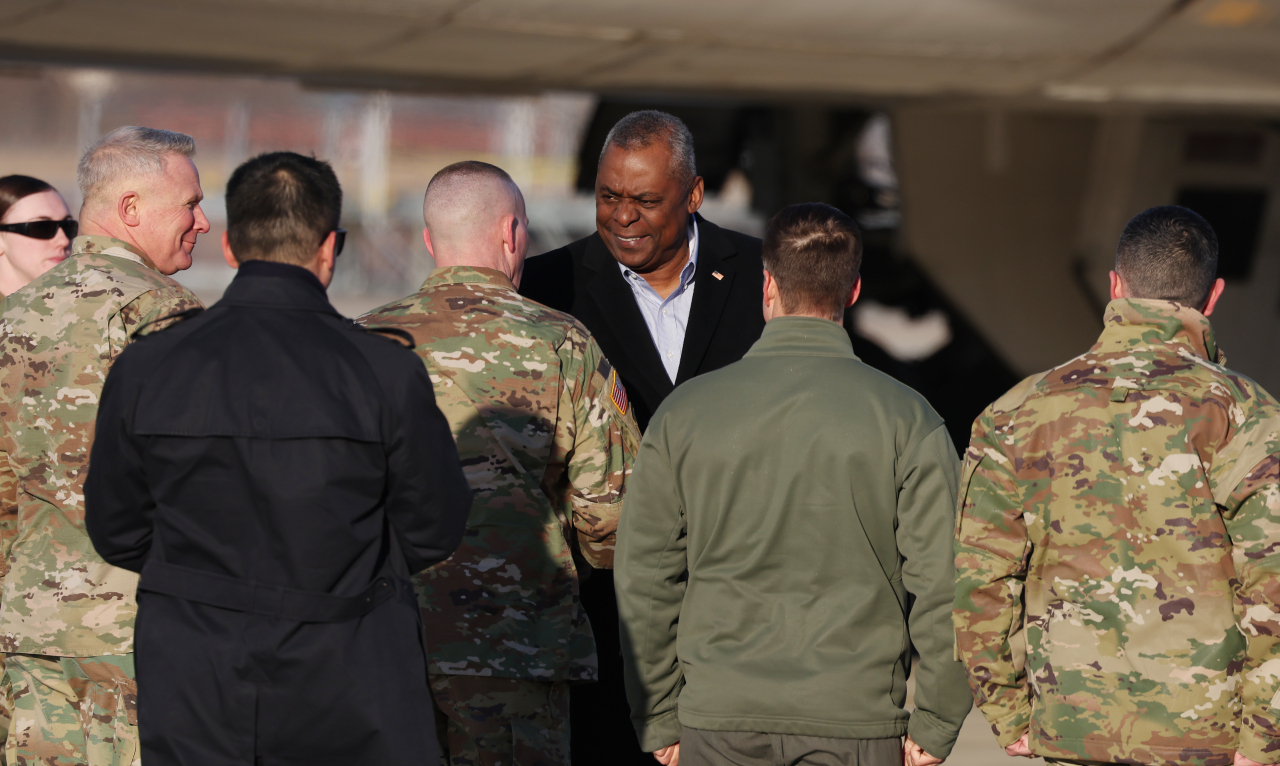
South Korean President Yoon Suk Yeol and NATO Secretary-General Jens Stoltenberg on Monday discussed a wide range of pending issues, including the North Korean nuclear issue, South Korea’s newly-released Indo-Pacific strategy, the partnership between South Korea and NATO, the presidential office in Seoul said.
“President Yoon asked the secretary general and NATO to play a proactive role to stop North Korea from making reckless provocations as North Korea has ratcheted up the level of provocation continuing to advance its nuclear and missile capabilities,” senior presidential secretary for press affairs Kim Eun-hye said in a written statement, adding Stoltenberg provided an affirmative response to the request.
Stoltenberg also briefed Yoon on the current situation in Ukraine and expressed gratitude for South Korea’s continuing support to Ukraine.
But Stoltenberg also underscored that the “wrong message that armed aggression is tolerated should not be imprinted on the international community,” Kim said after the meeting. In response, Yoon “committed to playing possible roles to support people in Ukraine in cooperation with the international community.”
Stoltenberg’s comment came as members of NATO, the US-led military alliance, have also ratcheted up deliveries of heavy weapons to Ukraine which has been fighting a grinding, 11-month war against Russia. The US and Germany have recently shifted stances and pledged to send battle tanks to Ukraine.
Prior to his meeting with Yoon, Stoltenberg openly urged South Korea to “continue and to step up on the specific issue of military support” to Ukraine, underscoring that many NATO member countries, including Germany, Norway and Sweden, have changed their policies of not providing weapons to countries in conflict.
“When the full-fledged invasion happened in February last year, then many countries changed their policy because they realized that the only way to stand up for democracy, help Ukraine prevail, and to create the conditions for lasting peace was to deliver military support,” Stoltenberg said Monday morning during his remarks delivered at the Chey Institute for Advanced Studies in Seoul.
Stoltenberg underscored the “urgent need for more ammunition, more weapons to Ukraine” to defeat Russia’s invasion.
“If you believe in democracy and if you don’t want autocracy and tyranny to win, then they need weapons. That’s the reality,” the NATO chief said, adding South Korea has the final say.
But South Korea’s Defense Ministry on Monday said the government has “maintained the stance that it is difficult to provide lethal weapons for Ukraine in light of the country’s security situation.”
On a separate meeting between South Korean Defense Minister Lee Jong-sup and Stoltenberg, a senior official at the ministry declined to confirm whether Stoltenberg requested South Korea to enhance military support to Ukraine.
Lee and Stoltenberg discussed ways to develop defense cooperation between South Korea and NATO and expand it to fresh fields such as defense science and technology, according to the ministry.
Both sides also committed to “achieving substantial outcomes in the fields, including cybersecurity and interoperability, in which South Korea and NATO have pursued active cooperation.”
South Korea has participated in the Partnership Interoperability Initiative since 2014 which aims to enable NATO partners to operate together with NATO forces according to NATO standards, rules, and procedures and using similar equipment.
Lee and Stoltenberg also agreed that South Korea and NATO have developed defense cooperation through channels such as exchanges between high-level military officials and joint training and exercises since South Korea became NATO’s global partner in 2006.

The latest South Korea-US defense ministerial meeting was held in Washington in November 2022. Austin’s visit to Seoul is the first by an American defense secretary since December 2021.
Lee and Austin are scheduled to meet Tuesday to seek ways to enhance coordination on North Korea policy and strengthen the viability of US extended deterrence and the alliance’s other pending issues, according to the Defense Ministry.
One of the main agenda topics would be the upcoming discussion-based tabletop exercise, led by the Deterrence Strategy Committee. The allies have agreed to stage such an exercise in the US in February to come up with policy responses against simulated North Korean nuclear attacks on the Korean Peninsula. Trilateral security cooperation among South Korea, the US and Japan, as agreed at the US-Japan summit earlier this month, is expected be put on the table.
The US Defense Department on Sunday said the defense chiefs will discuss the alliance’s role in preserving a free and open Indo-Pacific, underscoring that Austin’s visit to South Korea and the Philippines aims to strengthen the security environment in the Indo-Pacific, which is growing more complex.





